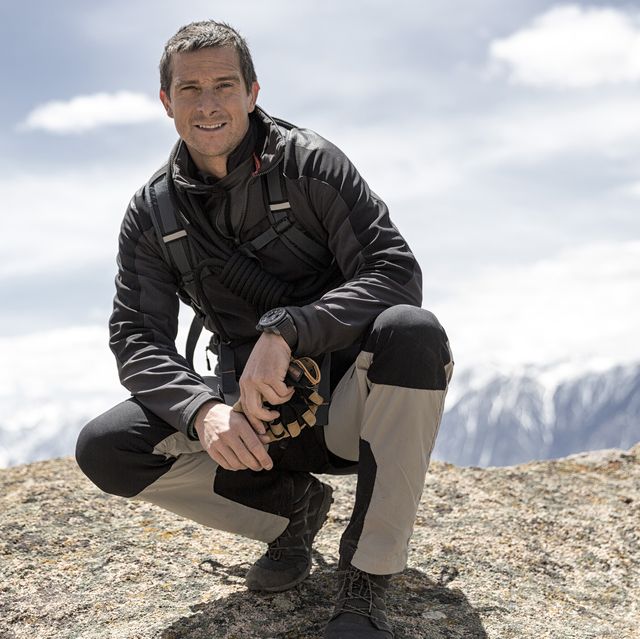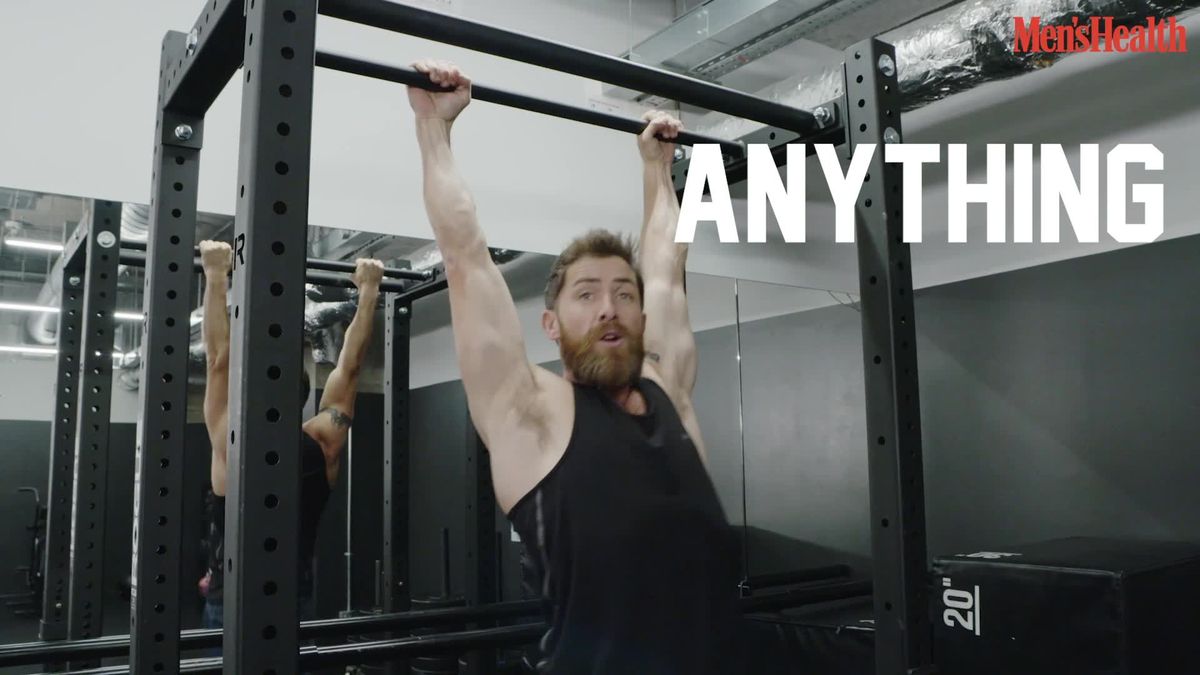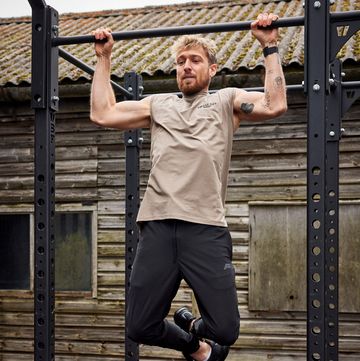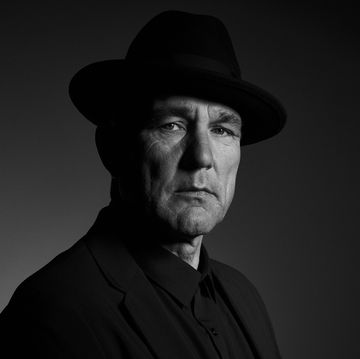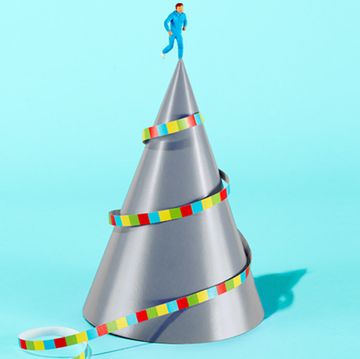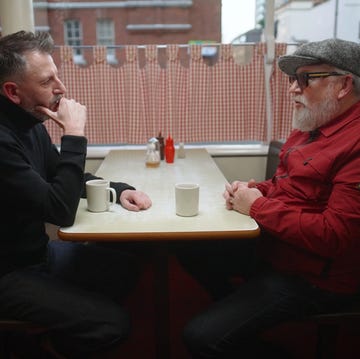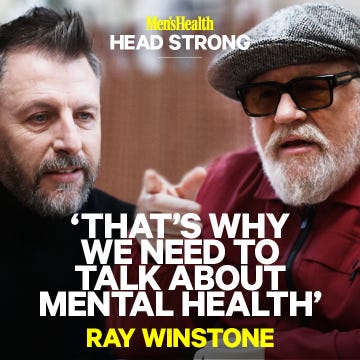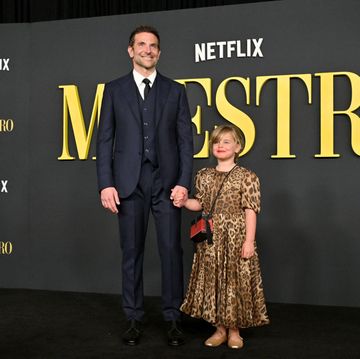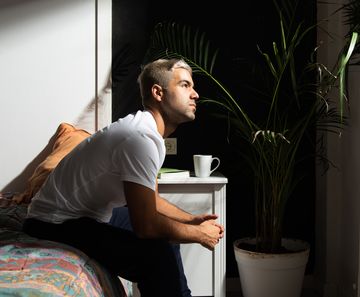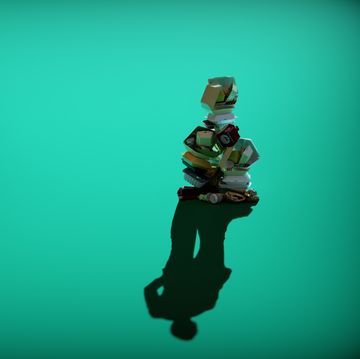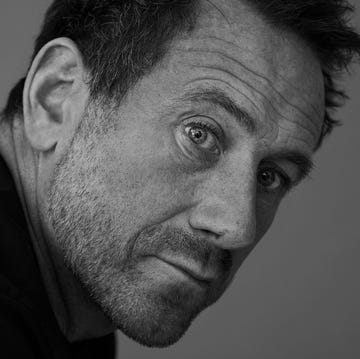Bear Grylls likes to live his brand. By that, we don’t mean he’s subsisting on moose blood and snake meat, nor swimming naked through frozen Siberian rivers – all stunts performed on his hugely popular TV shows. Rather he makes time in his schedule to connect with the outdoor world.
Here, the author, presenter and founder of the Bear Grylls Survival Academy talks Men’s Health through his morning routine, his secrets to a successful work-life balance, and why the lessons he teaches in the wilds can build resilience you can use in the real world.
Men’s Health: When you’re not speaking to MH, what does your routine look like on a typical Tuesday morning?
Bear Grylls: I wake up and take the dogs for a walk, barefoot if I can. I even try to take my shirt off. I’ll say my prayers and say thank you for all the things I’m grateful for, and sorry for the less-than-good stuff I’ve done. I’m not out for long, just 20 minutes or so. Then I come home and train. I’ve got some weights and a rig, so I’ll do a half-hour workout, every other day. I also try to get cold. If I’m near a river and it’s winter, I’ll get in. Otherwise, I’ve got a chest freezer that I’ve lined with silicon and rigged up a circuit breaker, so it turns off when it gets to 2oC. I’m only in there for three minutes.
If I’ve got a busy day ahead of me, I can get this done in 45 minutes. When I’ve got less going on, I take my time. Even when I’m filming, I’ll just go to bed early and then make sure I get up an hour before I’m due anywhere. I’ll follow one of the workouts on our Be Military Fit app. I also try to do a 14-hour fast as often as I can, as I find that helps with everything from my energy levels to how well I sleep at night.
MH: What’s the enduring appeal of the outdoors?
BG: It’s because nature is in all of us. We need it and yearn for it. It’s why when you’re on the coast, you stand at the shoreline, shut your eyes, listen to the waves and feel connected. It’s instinctive.
MH: But isn’t it harder to access in today’s indoors-focused world?
BG: There is no trick to finding that connection. It could mean a city banker spending their lunch break in a park and taking their shoes off. Walking is incredibly powerful, so getting off the Tube early to allow time for a 20-minute walk is an easy way to reconnect. The metronomic pattern of walking is proven to help humans think and process. Or you can hug your dog or pet, if you have one. Again, it’s scientifically shown to boost your mood. It could be as simple as stopping and listening to the birds, rather than looking at our phones. Take a moment to actively disconnect and just be. It doesn’t need to be complicated.
MH: How do you approach screen time with your children?
BG: We’re all about trying to empower them to police themselves. When they leave school, they’re going to have to be their own policemen on everything: drugs, booze, training, social media, nutrition and screen time. We try to guide them on how to make social media work for them. If you want to be entertained for a bit, research stuff and connect with friends, that’s great. But do it on your own terms and don’t become a slave to it. It’s like a candy: a few sweets won’t harm you, but if you have it all day, every day, it’s going to rot your teeth.
MH: Your job must make it hard to disconnect. How does the stress of running your business ventures compare to your career as a soldier and adventurer?
BG: I’m not that stressed, to be honest. People assume I’m mega busy, but I have an amazing team who shoulder a lot of the work. It means I can fit my responsibilities around my family, important dates at school and schedule time away from home at points in the year that will impact us the least.
When I was younger, I thought being busy equalled being successful. But that’s not the case. It’s about empowering others to feel capable of running with things. Take my academies: we have an incredible team. I just drop in to look over things now and then.
I have enormous respect for people who graft away quietly to provide for their families. Those are busy people. People who balance, say, working in the NHS with looking after their children and everything else.
MH: With those people in mind, can the skills taught on your courses be applied to everyday situations?
BG: Everything we teach in terms of wilderness survival and adventure skills is applicable to daily life. When you tell someone to put their head down and walk into the storm, it’s not just a physical battle, it’s a mental one. Our courses are more about developing a ‘survivor mindset’ than they are about the skills we teach.
Technically, ‘good survival skills’ means ‘stay still, don’t take any risks, make yourself safe and wait for rescue’. But in terms of TV, that’s quite boring, so I wanted to do something more dynamic. What happens if nobody’s coming for you and you have to self-rescue? What if all you’ve got is a roll of gaffer tape and a broken knife? Then it becomes fun. You just have to think outside the box. So, we instil that.
We try to instil positivity, quiet courage, resourcefulness and a never-give-up attitude. That’s how we get through the tough times.
MH: You’ve worked with an impressive range of people, including Barack Obama and, more recently, President Zelensky. To what do you credit your appeal?
BG: It’s very simple, actually: build people up. If you won Wimbledon or the FA Cup and in the interview afterwards you just talked about how brilliant you were, people would switch off. I found presenting hard to start with, and my first series of Man Vs. Wild was tough. I’m naturally an introvert, so to have all that focus on me was uncomfortable. But it gave me a platform to build Running Wild With Bear Grylls [on which Obama was a guest] – taking other people out into nature and hearing their stories.
Becoming Chief Scout is something I’m incredibly grateful for. I can meet young people all over the world and point them towards a local scouting group where they will be empowered. And I can tell them the truth – that I was a terrible scout, and they are going to be much better than I was!
MH: What’s it like to be an outdoorsman whose entire business is mediated by technology?
BG: Great survivors use everything. Technology is a big part of our lives, and we wouldn’t be effective modern survivors if we didn’t use it. But we do have to keep it in check and make sure it’s a tool that serves us, rather than becoming over-reliant. Survivors think about the future. You learn from the past and harness the best of it, then look at what’s around you to become a pioneer of the future.

David Morton is Deputy Editor at Men’s Health, where he has written, worked, edited and sweated for 12 years. His areas of particular interest are fitness, workouts and adventure.
